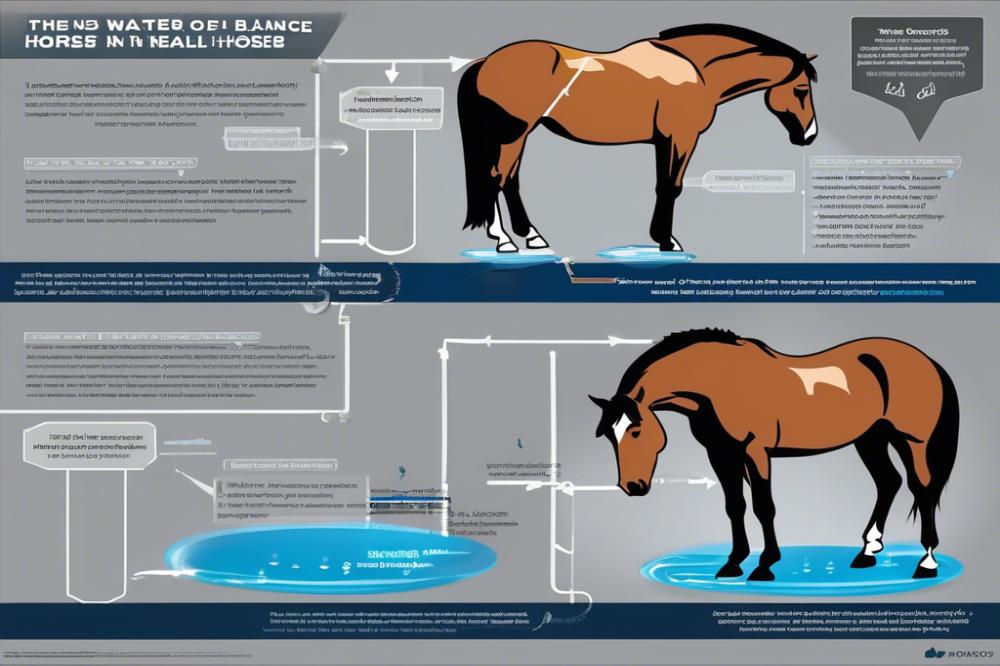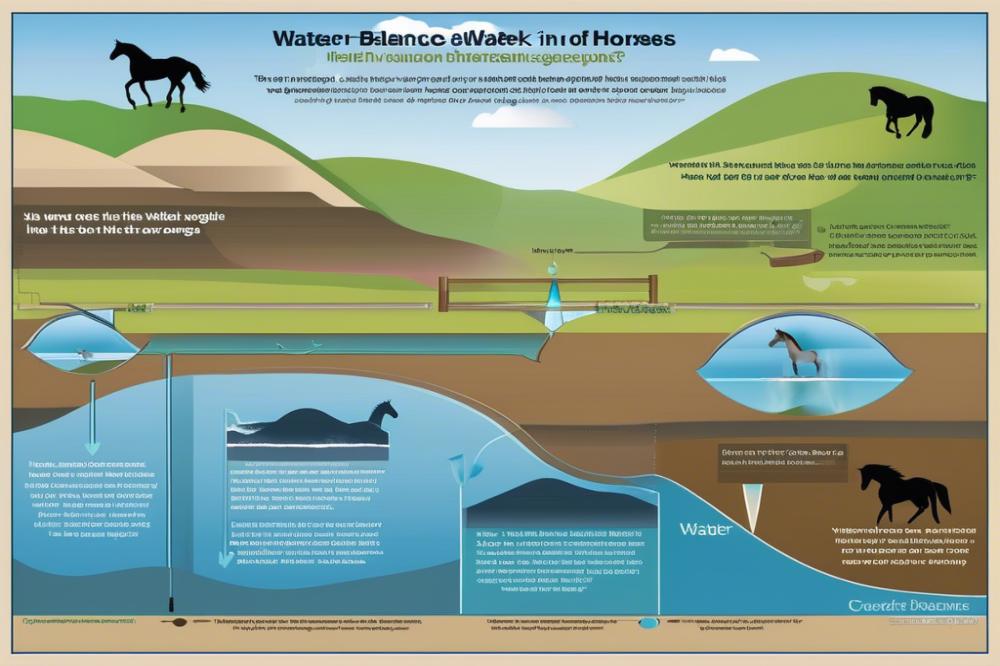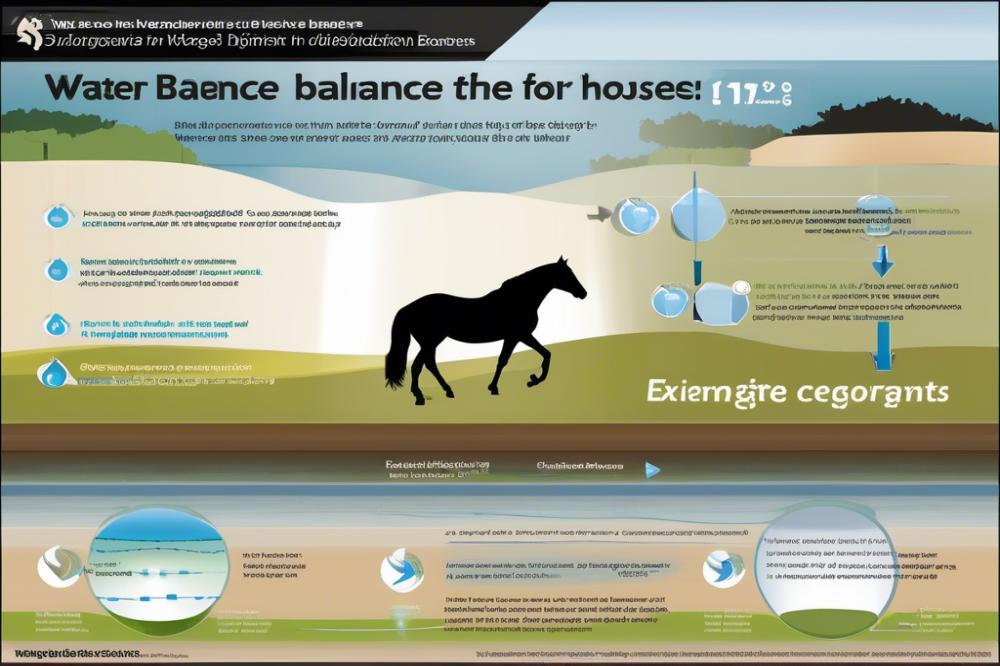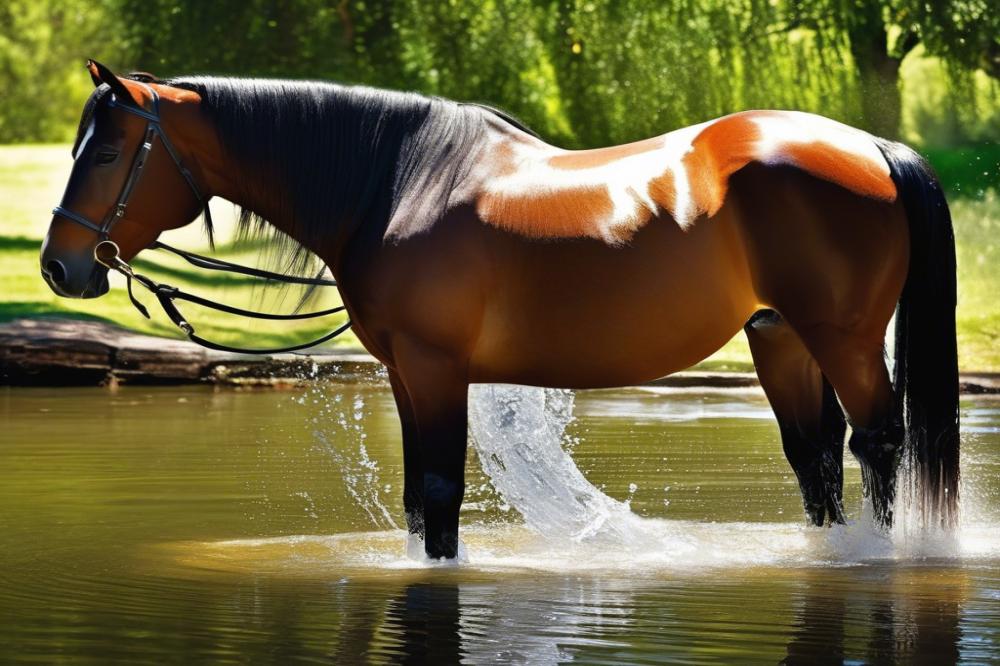The Importance of water balance in Horses’ Health
The role of water in maintaining equine wellness cannot be overstated. Horses, driven by instinct, are remarkable creatures that require careful management to thrive. Tantalizing fields, expansive trails, and tranquil pastures beckon to them, yet none can replace the significance of hydration. Water serves as the lifeblood for these majestic animals, impacting everything from digestion to overall vitality.
A horse’s body is composed mainly of water. This essential component supports physiological processes crucial for daily function. It aids digestion, lubricates joints, and regulates temperature. Insufficient intake can lead to dehydration, a silent adversary that mitigates performance and jeopardizes well-being. Thus, keeping an eye on hydration practices becomes necessary, particularly during warmer months or intense exercise.
Additionally, an understanding of a horse’s unique requirements can empower caretakers. Individual hydration needs vary based on exertion level, environmental conditions, and health status. Providing a consistent supply of fresh water daily creates a foundation for optimal, enduring health. As the wise say, water is life, and for horses, it is the elixir to maintain horse health.
Recognizing signs of dehydration not only benefits immediate care but enhances long-term health prospects. Such symptoms may include reduced energy levels or dry mucous membranes. A proactive approach to hydration may make all the difference. Just as a well-tuned instrument sounds its best, a well-hydrated horse performs at the height of its capabilities.
In essence, achieving proper hydration and understanding the concept of effective water balance are paramount. This not only preserves physical performance but also fortifies the animal’s resilience against potential health issues. Let us navigate the currents of keeping our equine companions healthy and vibrant. For more insights on providing the best care, explore the connection between crucial elements of their existence through resources about water balance and the fundamentals of horse health.
Water Balance and Horse Health

Water balance refers to the delicate equilibrium of fluid intake and loss that is crucial for all living organisms. In the equine world, maintaining this balance is essential for horses to thrive. Just like a finely tuned engine, a horse’s body requires precise amounts of water to operate effectively. Without it, they can struggle, much like a car running on empty.
Homeostasis is a fancy term for a stable internal environment, and it’s fundamental to a horse’s well-being. Whether it’s regulating body temperature or facilitating digestion, water plays a vital role in this process. Think of it as the oil in a machine; without enough lubrication, everything starts to grind and wear down. Hydration impacts blood volume, nutrient transport, and waste elimination. It’s not merely a preference; lack of adequate hydration can lead to severe health issues, including colic and dehydration.
When considering overall health, the effects of water equilibrium become even clearer. Horses that are properly hydrated exhibit higher energy levels, healthier skin, and better digestion. In contrast, dehydration can result in lethargy and hard, dry droppings. Imagine a horse on a hot summer day. Without ample fluid intake, it can quickly turn from a spirited companion to a sluggish shadow of its former self. Maintaining adequate hydration fosters better performance and enhances overall vitality.
Moreover, young horses and lactating mares are particularly vulnerable and depend heavily on proper hydration. Their needs are unique, in part due to their growth and reproductive requirements. When we neglect to monitor their fluid intake, we risk more than just a bad day at the barn; we jeopardize their future health. As caretakers, we must remain vigilant. Think of hydration like an investment in a horse’s health: the more you put in, the greater the returns in terms of energy and well-being.
In essence, water serves as a cornerstone of equine health. Whether out on a trail ride or in intensive training, the presence of fresh and accessible water should always be a priority. Providing a constant supply of clean water is like giving a horse a ticket to show up at its best. Fostering a good relationship with hydration can lead to more spirited gallops and less frequent trips to the vet. After all, keeping a horse hydrated is a crucial part of responsible horsemanship.
Hydration Needs for Horses

Horses possess a remarkable physiology, but hydration needs can vary significantly from one equine to the next. Several factors influence their water intake, driving home the importance of understanding these variables. For instance, a horse’s size is a primary consideration; larger animals naturally require more fluids to maintain their body functions and promote well-being. Likewise, activity levels dictate how much they should drink. An active horse that regularly participates in training or competitive events will have a greater demand for water compared to one that spends leisurely days in the pasture.
The environment also plays a crucial role in determining daily water intake. Hot weather can lead to increased perspiration, causing a horse to lose valuable fluids more quickly. Cold temperatures, on the other hand, may reduce their desire to drink, often complicating hydration efforts. Additionally, factors like diet can impact how much water a horse needs. For example, a horse consuming dry hay may require more water than one that eats wet grass. It’s a delicate balance, much like walking a tightrope, and keeping an eye on these elements is vital.
Management practices at the stable are essential in promoting fluid intake. Offering fresh, clean water at all times should be a priority. Horses are creatures of habit; if they become accustomed to having unrestricted access, they will drink as needed. Disallowing long stretches without available fresh water can lead to dehydration, which could spiral into more serious health concerns. Water troughs should be checked regularly for cleanliness to encourage drinking behavior; after all, no one wants to sip from a dirty cup.
To complicate matters, individual preferences can also dictate water consumption. Some horses are more finicky than others when it comes to what they drink. Establishing a routine with respect to when and how they access water can make a significant difference in how hydrated they remain. In the end, keeping horses well-hydrated is not just a matter of supplying water. It is an intricate dance involving attention to detail, understanding of their unique needs, and keen observations of their daily routines.
Electrolytes and Their Role in Hydration

Electrolytes are minerals that carry an electric charge. They play a crucial role in the body, especially when it comes to hydration and maintaining bodily functions. Sodium, potassium, calcium, and magnesium are some key players in the electrolyte game. Each of these ensures that muscle contractions, nerve functions, and the balance of fluids are effectively managed. Without adequate electrolytes, hydration becomes futile, much like trying to fill a sieve with water.
The relationship between electrolytes and water absorption is both intricate and vital. When a horse exercises or sweats, it loses not just water but also these essential minerals. This loss can disrupt the balance necessary for optimal performance. Electrolytes assist in retaining water within cells and tissues. It’s somewhat akin to having a sponge that works more efficiently when it’s properly soaked with both water and a little salt. So, in essence, without electrolytes, a horse’s ability to absorb water diminishes significantly, leading to potential dehydration.
Managing electrolyte levels takes on a new dimension during exercise and hot weather. As temperatures rise, horses are more likely to sweat profusely. At this point, monitoring their mineral levels becomes imperative. Providing easy access to an electrolyte supplement can be a real game-changer. It’s similar to ensuring your favorite sports drink is on hand after a long jog.
Some owners might wonder how to spot the signs of an electrolyte imbalance. Look for signs like fatigue, confusion, or loss of appetite. These may indicate that a horse is struggling. Riding on these clues can lead to prompt actions that restore balance. Keeping track of water intake is also essential. Hydration must be prioritized, particularly after strenuous activities.
Incorporating electrolytes into a feeding regime can be surprisingly straightforward. Many equestrians opt for formulated products specifically designed for horses. These often come in a powdered form that can be easily mixed with feed or water. The key is to find a routine that works while observing how your horse responds. Like every good partnership, communication is vital, and in this case, your horse is your best advisor.
Effects of Dehydration on Performance and Health
Identifying Signs of Dehydration in Horses
Recognizing the early signs of dehydration in horses can be crucial. Perhaps you’ve noticed a change in attitude or behavior. Horses may become less energetic and show a reluctance to work or even move about. Checking the horse’s mucous membranes can offer clues; dry, tacky gums often indicate a lack of hydration. Additionally, skin elasticity serves as a helpful indicator. A simple pinch of the skin should spring back quickly. If it takes longer than a second, your horse might be in trouble. Observing the color of urine can provide insight too; a dark yellow or amber hue often signals dehydration.
Short-term and Long-term Health Risks Associated with Dehydration
Dehydration can lead to immediate and alarming issues. In the short term, horses can suffer from colic, heat stress, and an increased risk of tying-up. When fluid levels drop, the horse’s body struggles to regulate temperature. This situation can escalate quickly. Long-term effects can be devastating. Chronic dehydration can result in kidney damage and serious metabolic disorders. Over time, a lack of sufficient fluids may impair nutrient absorption. Another worrying aspect is how it affects joint health, leading to injuries due to insufficient lubrication.
Impact of Dehydration on Performance and Recovery
A horse that is not well-hydrated will struggle when it comes to performance. Think about it; how can an athlete give their all without proper fuel? Dehydration decreases stamina, making even routine tasks feel arduous. Muscle fatigue sets in faster, and recovery times can stretch longer than they should. After intense activities, replenishing fluids becomes vital. Without doing so, horses may experience prolonged soreness or stiffness. When it comes to recovery, hydration plays an essential role. Adequate fluid levels facilitate nutrient transport to muscles, promoting effective recovery post-exertion. Training sessions might turn into nightmares if hydration isn’t actively managed.
Water Balance During Exercise
Exercise significantly increases a horse’s demand for hydration. As muscles work harder, they generate heat. To dissipate this heat, a horse sweats. Loss of fluid through sweat can be substantial, especially during prolonged or intense activity. This results in a unique challenge for maintaining hydration.
Adequate fluid intake before, during, and after exercise is essential for overall well-being. Equally important is recognizing the symptoms of dehydration. Signs can include dry gums, lethargy, and decreased skin elasticity. A keen eye can make all the difference. Observing your horse’s behaviors and physical signs leads to better hydration management.
Implementing strategies to maintain hydration is straightforward. Offering small amounts of water frequently can promote drinking. For those horses that turn up their noses at plain water, a splash of electrolyte solution can do wonders. Additionally, providing water every 30 minutes during exercise can replenish lost fluids effectively.
Besides hydration, water plays a pivotal role in post-exercise digestion. After the physical exertion ends, the body begins to recover. Proper fluid intake aids in nutrient absorption, ensuring that your horse reaps the benefits of the food consumed. Water helps dissolve nutrients, making them more available for absorption in the intestines. When digestion functions efficiently, recovery comes quicker.
Bridging the gap between fluid loss and replenishment is vital to a horse’s health. Think of water as the forgotten hero in your horse’s fitness journey. Never overlook its importance, especially during and after exercise. With thoughtful planning and attention, owners can support their steeds effectively.
The Crucial Role of Hydration in Equine Wellness
Recognizing the significance of proper hydration cannot be overstated. Equines, like any other creature, depend on adequate fluids to fuel vital processes within their bodies. This essential component affects digestion, temperature regulation, and overall performance. A well-hydrated horse stands a better chance of enduring physical exertion and maintaining energy levels.
The balance of fluids demands attention and care. Owners must monitor intake consistently, especially during warmer months or times of increased activity. It’s not merely a matter of offering water; the quality and accessibility also play a critical role. Horses require an inviting environment that encourages them to drink regularly.
An effective approach often involves a multi-faceted understanding of their dietary needs. For instance, incorporating specific feeds can improve overall equine nutrition. When hay or grains are consumed, they absorb moisture, enhancing hydration. This interplay highlights the notion that water intake isn’t solely about liquid consumption but rather encompasses the entire dietary approach.
Training and conditioning sessions present unique opportunities to promote hydration. As these majestic creatures sweat and expend energy, providing electrolytes can further balance necessary fluids. This proactive measure aids in replenishing what’s lost and supports recovery.
Understanding the intricacies of these needs allows caretakers to uphold their responsibilities toward these animals. The results speak volumes, showcasing improved behavior, performance, and vitality in equines. Regular check-ups and advisements can refine strategies and reinforce practices, fostering a culture of awareness regarding hydration. For a deeper exploration of this topic, hydration methodologies can lead to better outcomes.
In summation, nurturing a well-balanced approach to hydration stands foundational to the longevity and vitality of horses. Take the first step towards enhancing your horse’s lifestyle. Embrace this opportunity to enrich your knowledge and support your equine friend by signing up for our service here.



